| Welcome |
|
Feb 6, 2019
Vegeketonian
Hi ,

So the new year is still fresh and you still plan to live 2019 as healthy as possible. Right off the bat you have chosen a serious challenge. The single biggest thing that impacts your health is what you put into your mouth and allow into your lungs. It
seems super obvious that the first step toward health is to get rid of the poisons going into your body. There is not even a little bit of disagreement that smoking is a bad idea and neither is eating pesticides, fungicides, herbicides, and insecticides. The “cide” at the end of the word is Latin for “to
kill” - like homicide or suicide. So these things will kill you; they are not good for your health, and yet these things are all over your fruits and vegetables and inside the meats and dairy you eat all the time. It is especially all over the wheat, corn, rice, and soy all your packaged foods are made from. So step
one for 2019 is to eat organic foods exclusively.
Food is one big step, but lets look at drink and inhalants. Food coloring, sugar, and artificial sweeteners are poisons, so that takes the fun out of soft drinks. Alcohol is tolerable up to 2 units a day, but beyond that it burns little holes in your gut. Can we even find clean water anymore? Air pollution is associated with all sorts of diseases including of all things, diabetes. Outdoor air pollution is pretty well understood as bad, but indoor air pollution from such things as cleaning products, building materials, and the worst of the lot – air fresheners is a source of poison most people don’t 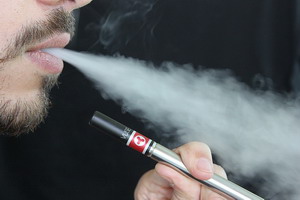 think about. Just because it does not have
the link to cancer yet, vaping, dope smoking, or any other type of drug inhalation is seriously damaging to your lungs. think about. Just because it does not have
the link to cancer yet, vaping, dope smoking, or any other type of drug inhalation is seriously damaging to your lungs.
This covers some of the basics of health – eat clean food, drink clean water, and breath clean air. When said this way it sounds simple and easy. Yeah, I want clean food, water, and air! Where do I find it? Organic, home- cooked food, purified water, and air purifiers are where I start, but this is
only a starting point.
Starting point? Change everything I eat, drink, and breathe? What more can there be? Well, we could talk about sleep, exercise, light exposure, cooking methods, social participation, intermittent fasting, and on and on, but this newsletter is focused on food. What foods are best for us after we meet the clean poison-free requirement? This is a fuzzy rabbit hole to dive down, filled with lots and lots of opinions and tons of conflicting research. I have been trying to make sense of all this information for the last 50 years. That’s right, I started at age 16 with articles in my Scientific American subscription. By age 18 I started my first fasting as a freshman at UCD. I did a couple years as a protein complementing vegan while in
Chiropractic school. This left me with serious low blood sugar problems, so I 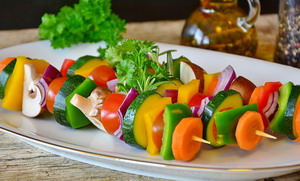 changed to a lacto-ovo vegetarian. This helped, but I didn’t really recover until I found the Atkins diet and switched to a ketone based energy system. changed to a lacto-ovo vegetarian. This helped, but I didn’t really recover until I found the Atkins diet and switched to a ketone based energy system.
What I have learned over the years is that variability is the rule. People are different, and what works best is different for everyone. There are basic rules such as avoiding poisons that apply to everyone. But even there, certain foods are poisonous to some people and not to others. Food allergens,
lectins, saponins, histamines, sulfites, the list goes on and on of food reactions that hit some people and not others. Because of this there are literally thousands of diets out there, and each one is a miracle for a few people and helpful for a larger number. So what I am saying is that each of us has to find out what works for us through trial and error.
That said, there are a few basic biochemical realities we have to deal with. The most basic is that every human can potentially run on one of two energy sources – sugar or fat. Ideally we should be flexible enough to run on either one depending on what is
available. 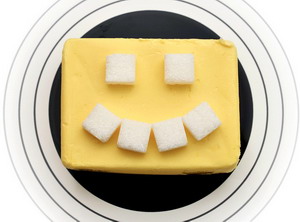 Biochemically sugar burning is dirty; it produces free radicals that damage surrounding tissues. Fat burning is much cleaner and does not produce the levels of inflammation- causing free radicals. So what advantage
would there be to burning sugar? Well, sugar burns faster. For tissues that need to operate on bursts of energy like sprinting muscles, sugar is the fuel of choice. For tissues that lope along at a fairly steady rate and can’t afford to be damaged, like the heart, fat burning is the way to go. In fact your heart only burns fat/ketones. Biochemically sugar burning is dirty; it produces free radicals that damage surrounding tissues. Fat burning is much cleaner and does not produce the levels of inflammation- causing free radicals. So what advantage
would there be to burning sugar? Well, sugar burns faster. For tissues that need to operate on bursts of energy like sprinting muscles, sugar is the fuel of choice. For tissues that lope along at a fairly steady rate and can’t afford to be damaged, like the heart, fat burning is the way to go. In fact your heart only burns fat/ketones.
Long distance endurance athletes have recently figured this one out, and most have switched to a fat burning metabolism. Sprinters still do carb loading however. The spotlight lately has been turned on degenerative diseases. The boomers are getting older and not liking the physical consequences of aging. Inflammation is a big focus right now, and sugar burning promotes more
inflammation than fat burning. Combine that with the recent expose of the fraudulent demonizing of saturated fat during the last 50 years and we are seeing a resurgence of interest in fat energy burning diets – the so called keto diet. Of course this is just the old Atkins low carb diet in fancy new clothes – the same diet I have been living with for the better part of the last 35 years.
The keto lifestyle is coming on the heels of the paleo diet movement, and the two have overlapped to a large degree for many people. Both approaches are typically engaged through the consumption of large amounts of meat and eggs. Keto gets to add in dairy products, but 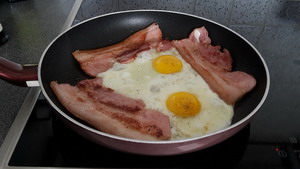 tosses out the sweet potatoes and loads of fruit allowed on the paleo diet. The core picture with both,
however, is the piles of steak, eggs, and bacon – glorious, heavenly bacon. Is eating meat a good idea? tosses out the sweet potatoes and loads of fruit allowed on the paleo diet. The core picture with both,
however, is the piles of steak, eggs, and bacon – glorious, heavenly bacon. Is eating meat a good idea?
I know lots of people feel there is a spiritual concern with eating animals for meat. Personally I find it rather narcissistic to assume that we know the “Mind of God” sufficiently to be certain that our belief that animals are superior to plants is true. We don’t know that. The only way to be truly spiritually square at dinner time is to be a scavenger and eat only things that died for reasons
other than us.
There are reasons not to eat meat. Animals concentrate poisons in their flesh just like we do. Obviously if you feed the animals (or fish) clean, organic food then this is not a concern, but most meat in the US (not the rest of the world) comes from feedlot operations 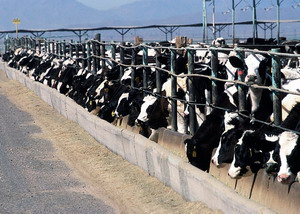 where the animals are fed grains covered with agricultural poisons and spiked with antibiotics and growth hormones. These poisons are concentrated in the animal’s flesh waiting for us to eat it and concentrate it in us. But these same problems exist with most fresh fruit and vegetables in this country. The real issue is getting clean
food. Yes, there are concerns about particular poisons formed in the gut when we eat meat, but there are the same concerns about other poisons formed in the gut when eating various plants, so that is a wash. where the animals are fed grains covered with agricultural poisons and spiked with antibiotics and growth hormones. These poisons are concentrated in the animal’s flesh waiting for us to eat it and concentrate it in us. But these same problems exist with most fresh fruit and vegetables in this country. The real issue is getting clean
food. Yes, there are concerns about particular poisons formed in the gut when we eat meat, but there are the same concerns about other poisons formed in the gut when eating various plants, so that is a wash.
I guess the only legitimate reason not to eat meat is the animal cruelty issue. So for that reason (ignoring the possibility that plants can also suffer) you may not want to eat meat. Well the good news is that meat eating really has nothing to do with eating either keto or paleo. You can do both without eating
meat. Going keto simply means centering your metabolism in a fat burning mode. In fact eating nothing at all makes you go keto. Eating avocados, most nuts, olives, coconut, or any other plant sourced fats will turn you keto if you simply avoid the carbs. I do keto all the time by simply eating salads. Salads
are also paleo of course. In fact back in true Paleolithic times, meat was a rare luxury. Taking down a meat animal with a chipped rock is not as easy as it sounds.
Once you have been in a ketone/fat burning mode for a while, like more than a month, your tolerance for slow complex carbs increases. You might start out having to stay below 20 grams of carb a day in the beginning, but after time that level might raise to 50, 60, even 70 grams of carb a day and still allow you to stay in ketosis.
What is ketosis you ask? When you are in fat burning your body releases long triglycerides from fat stores to feed the body, but these molecules are too big to cross the blood-brain barrier, so your liver converts the triglycerides into little tiny energy molecules 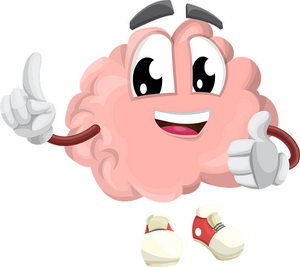 called ketones. They can get into the
brain so your brain can be happy. Most of your body just burns the fats, but certain tissues need ketones. That is why you might be in full fat burning mode, but your ketone meter of urine test strips will hardly show anything. You brain is using up the ketones as fast as your liver can produce them, so there might be very little ketones floating around even though you have eaten no carbs. called ketones. They can get into the
brain so your brain can be happy. Most of your body just burns the fats, but certain tissues need ketones. That is why you might be in full fat burning mode, but your ketone meter of urine test strips will hardly show anything. You brain is using up the ketones as fast as your liver can produce them, so there might be very little ketones floating around even though you have eaten no carbs.
Interesting factoid: most of the protein you eat over 40 grams is turned into sugar and eventually fat anyway. Your body can only use so much protein and that is limited by the amounts of the 9 essential amino acids present. You can actually meet your daily protein needs by consuming about 10 grams of the right mixture of just the essential amino acids. This might be useful for folks on a long weight loss regime to prevent muscle loss.
Vegetables contain protein – more than enough to meet your needs if you combine different vegetables appropriately. Generally a single vegetable source will be deficient in one or more of the essential amino acids, but proper mixing and combining of vegetable sources will cover these deficits. For instance a bunch of spinach
has almost 10 grams of protein and broccoli has about 1 gram of protein per ounce. Understand that in doing a keto vegetarian program, or what I am calling a vegeketonian diet, you want to eat a lot of vegetables – like a couple pounds a day at least. For more 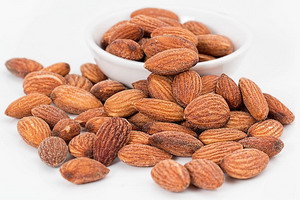 concentrated protein source reach for nuts
like almonds, which have 30 grams of protein per cup. So a good vegeketonian diet will contain lots of vegetables cooked in stable saturated vegetable fats like coconut, olive, and avocado, moderate amounts of nuts and nut butters, salads topped with dressings made from olive and avocado oils, and loads of herbs. When your carb
tolerance increases, you can include starchier root vegetables like beets, rutabagas, and even sweet potatoes. Stay away from grains and legumes, and super high sugar fruits. Low carb fruits like berries, whole citrus, plums, peaches, and Asian pears are good choices. Be cautious with the vegetables that contain the seeds, as these are usually high in lectins, which are a problem for many folks.
For fun I usually make liberal use of zero carb noodles made from konjac root in both stir fry and salads. concentrated protein source reach for nuts
like almonds, which have 30 grams of protein per cup. So a good vegeketonian diet will contain lots of vegetables cooked in stable saturated vegetable fats like coconut, olive, and avocado, moderate amounts of nuts and nut butters, salads topped with dressings made from olive and avocado oils, and loads of herbs. When your carb
tolerance increases, you can include starchier root vegetables like beets, rutabagas, and even sweet potatoes. Stay away from grains and legumes, and super high sugar fruits. Low carb fruits like berries, whole citrus, plums, peaches, and Asian pears are good choices. Be cautious with the vegetables that contain the seeds, as these are usually high in lectins, which are a problem for many folks.
For fun I usually make liberal use of zero carb noodles made from konjac root in both stir fry and salads.
So there you have it – a Paleolithic low carb ketogenic vegan eating plan that can be tailored to be super clean 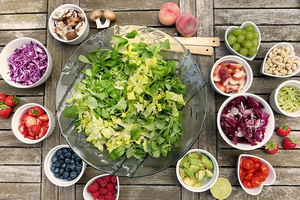 and healthy. What more could you ask for? Personally I don’t have a problem eating clean meats from sustainable sources, but if your choice is to go meat-free, the vegeketonian
diet is a good way to go. and healthy. What more could you ask for? Personally I don’t have a problem eating clean meats from sustainable sources, but if your choice is to go meat-free, the vegeketonian
diet is a good way to go.
Take care,
David

We have some profoundly cute fabric art made by Linda Edwards specifically for the upcoming Valentine's holiday. These are ridiculously inexpensive for the work involved in creating them freehand with a sewing machine - only $35.
Ellen update: 
One of my presents to Ellen for her birthday this year was going to the Harris Center to see Jersey Boys. She absolutely loved it. She even got a shirt to remember the experience.
David
|
| |
| |
| |
Too much screen time retards development of children 
Screen time such as playing with a cell phone, tablets, and watching TVs is slowing their physical and mental development. The strongest findings were with 2 and 3 year olds showing developmental delays at age 5.
Screen time
_____________________________________________
"Every truth has two sides; it is as well to look at both, before we commit ourselves to either."
~ Aesop
__________________________________
Fullness hormone decreases cognitive impairment
High levels of the hormone CCK, which is released by your stomach in response to proteins and fats, has been found to decrease early Alzheimer's by 65%. CCK slows stomach emptying and increases bile production and pancreatic enzyme release. It also tells our brain we are full while we are eating.
CCK
________________________
" The level of our success is limited only by our imagination and no act of kindness, however small, is ever wasted."
~ Aesop
_________________________________________________
Super Poo Fecal transplants sometimes produce miraculous improvements in a variety of disease states. But the results are highly variable. When looked at more closely it has been found that certain people have super poo that produces results twice as powerful as regular folks. What that means is not clear yet, but they seem to have a very large number of different bacteria, but that is not all.
Interesting...
Fecal transplants sometimes produce miraculous improvements in a variety of disease states. But the results are highly variable. When looked at more closely it has been found that certain people have super poo that produces results twice as powerful as regular folks. What that means is not clear yet, but they seem to have a very large number of different bacteria, but that is not all.
Interesting...
Super Poo
_________________________________________
"Gratitude is the sign of noble souls."
~ Aesop
_____________________________
Our address is 9725 Fair Oaks Blvd. suite A
Our hours are M - F 10 to 3:30
Finding the new location is very easy. Coming from highway 50 up Sunrise Blvd, you turn left and go up a block. We are on the right hand side - the building just past the Subway Sandwich shop. If you are coming down Sunrise from the Mall area then just turn right on Fair Oaks Blvd and up a block on the right.
If you are coming from the Roseville area you could come down Sunrise Blvd, but that is a long trek. It is probably shorter time wise to come down Auburn Blvd - San Juan Ave like you have been for the Sunset office, but instead of turning left at Sunset, keep going straight 3 more lights to Fair Oaks Blvd and turn left. Go down 2 lights to New York Ave, go through the intersection, and immediately turn into the turn lane once the center
divider ends. We are on the left.
You are free to reprint this article in your newsletter as long as you include the following statement in the same size type and color:
"This article appears courtesy of Fair Oaks Health News, offering natural and healthy solutions for body, mind and soul. For a complimentary subscription,
visit http://www.fairoakshealth.com"
Referral doctor for when we are out of town: Jennifer Webb DC
Jennifer Webb DC
6216 Main St. suite C1
Orangevale
988-3441
|
| |
|
|
|
_______________
to check on old newsletters
_______________
About Dr. DeLapp
|
Dr. DeLapp has been a philosopher, non-force Chiropractor, medical intuitive, and health innovator for over 35 years. He began experimenting with medical intuition in 1972 while studying physics at UC Davis. In addition to physics he designed and completed an individual major in the philosophy and psychology of education. Shortly after he choose to pursue a career in the only
truly health oriented profession available at that time, Chiropractic. He graduated with honors in 1981 with his doctorate and opened a private practice.
Since that time he has continued his research into the effects of consciousness and learning on health.
He developed the Biomagnetic Retraining system for correcting movement abnormalities.
Since 1991 he has focused on developing a powerful system for uncovering and assisting the mind-body connection in health and personal growth. The in-depth coaching, guided by the subconscious direction from the body, is called Heartflow and the simpler mind-body retraining for health and unfoldment he has named Gracework. Both are available at Fair Oaks Health.
Fair Oaks Healing
& Arts Center
Staff
 Dr David DeLapp DC
Dr David DeLapp DC
Chiropractor
Ellen Flowers FGM
Spiritual Life CoachEnergetic Nutritionist
Health Care Coordinator
Susan Richardson
Office Manager
Front Desk
Sherry Herrera
Front Desk Person
Susan McDonald
Catherine Cummings
New Products
Purity Oil Spray
Pain Relief
Essentials
CBDs plus 9 essential oils
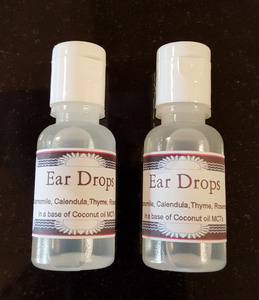
Ear Drops
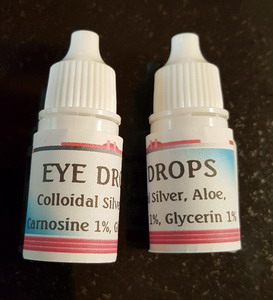
Eye Drops

Super Concentrated
Fish oil
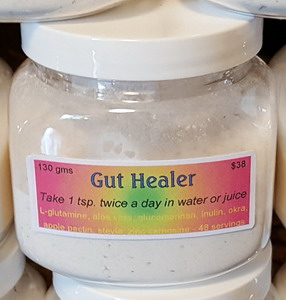
Gut Healer
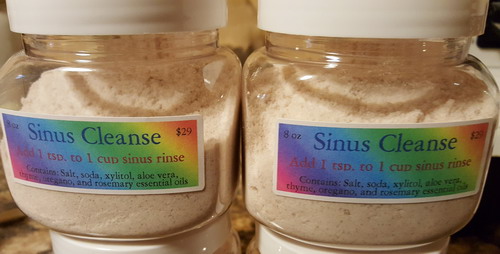
Sinus Rinse
Powder

Balanced Salt
|
|

